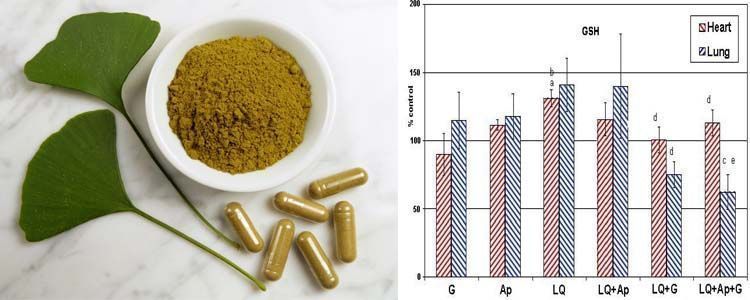The properties of Ginkgo biloba it offers us a complete list of remedies that today we can enjoy in the most comfortable and safe way possible.
This ancient tree, due to its capacity for resistance, has been attributed since World War 2 a great medical importance, so its active components have been subjected to scientific studies to confirm its positive effect on the organism.
We are going to tell you the main properties of Ginkgo biloba and the most comfortable way to use it. All always under the protection of the scientific community and with studies already published in journals and specialized organizations.
Table of Contents
The Ginkgo biloba tree
Ginkgo biloba, is a tree whose origin is in China, which has been cultivated for many years with the aim of obtaining from it several resources, including medicinal properties.
There is a lot of magic and legend of Ginkgo biloba, as it is unique in its kind and the only survivor, so it is often considered a living fossil.

Both its leaves and seeds have been used since time immemorial by traditional Chinese medicine, where the properties of Ginkgo biloba were already known. From there it has been derived to the current use and research.
The properties of Ginkgo biloba are numerous and every day new research appears that ratify it, mainly due to some of its unique phytocomponents.
From the leaves of Ginkgo are extracted compounds known as flavonoids, whose names are ginkgoloide, in addition to other heterosides.
Its medicinal contribution is being studied by stimulating the blood circulation it produces and antiplatelet function.
Although its origin is Chinese, we can find it today planted in almost all the capitals of different countries, such as Argentina, France, Spain, the United States, etc.
Properties of Ginkgo biloba
At the pharmacological level, the properties of Ginkgo biloba are defined by the presence of active groups such as glycosides, flavonoids and terpenes present. We tell you the main ones and from what part of the tree they can be extracted.
Among the main compounds are ginkgolic acid and several flavonoid glycosides, which comprise 24% of the total Ginkgo leaf extract (EGb 761).
In fact, most pharmacological products accepted by European health authorities are composed of 24% glycosides, especially in the form of tablets from 500 to 600 mg.
The properties of Ginkgo biloba are defined by its neuroprotective, cardioprotective, blood pressure reducing capacity and preventive effect against different types of cancer.
However, let’s look at each of the effects in a deeper, scientifically evaluated way.
May help fight inflammation
This antioxidant effect of Ginkgo biloba can also help reduce inflammation in organs and joints. This is achieved by reducing the anti-inflammatory response that automatically activates the body.
Therefore, positive responses have been found from the use of ginkgo extract when it comes to reducing markers of inflammation in human cells, so it is the previous step to be able to combat chronic inflammatory states due to complicated diseases. [Study]
In such a case, we are talking about chronic inflammations of arthritis, intestinal diseases, coronary and even cancer, where the properties of Ginko biloba can act.
However, it is still necessary to deepen the information obtained and carry out more substantiated tests to strengthen the knowledge of the properties of Ginkgo biloba.
Contains powerful antioxidants

One of the main effects attributed to ginkgolic acid is its antioxidant potential. In turn, other compounds such as terpenoids and flavonoids also collaborate in this effect. [Study]
Its antioxidant effect prevents the presence of free radicals that produce harmful effects on metabolic activity and negative cellular oxidation, which can lead to the formation of specific tumors or damage healthy tissues.
This antioxidant effect is, to this day, very promising by the scientific community, although they are still without comprender the origin of this effect and how to treat specific diseases.
Improves circulation and heart health
The cardioprotective effects of Ginkgo have been contrasted in more than one scientific trial. In turn, these effects can also be replicated in other organs such as the liver or kidneys.
A study conducted in people who had coronary heart disease received Ginkgo extract supplements, obtaining a considerable increase in blood flow. The explanation is due to the increase (almost 12%) of the nitric oxide produced, which encourages this activity and improves the dilation of blood vessels. [Study]
Like this study, there are several that refute these properties based on promoting nitric oxide production.
Good results have also been obtained in other organs for the protective and anti-inflammatory effect of the properties of ginko biloba. [Study]
Reduces pms symptoms
The potential effects of Ginkgo extract are very varied.
One of them is to reduce the symptoms of premenstrual syndrome with the consumption of extract of the plant, obtaining a notable reduction of 23%. [Study]
However, it is necessary to deepen with several more trials the effect and origin of this improvement.
Reduces symptoms of psychiatric disorders and dementia
Mental illness and neuronal degradation are increasingly the order of the day. The main cause is the increase in life expectancy. Therefore, it is essential to find ways of products, if possible natural, that combat states of anxiety, stress and prevent diseases such as Alzheimer’s and others with cognitive impairment due to aging.
There are several scientific studies where different extracts of Ginkgo biloba appear that can increase cognitive capacity in patients with Alzheimer’s in the early stages. However, this information has not been able to be repeated over time and has lost some consistency. [Study]
Its medium-term effect (from 22 to 24 weeks) in reducing the symptoms associated with the onset of dementia has also been evaluated, with a significant reduction. Likewise, more repeatability studies are needed to strengthen the results.
Improves brain function and well-being
What has been obtained from the properties of Ginkgo biloba is a positive effect of brain function in healthy patients (without mental illness).
It is considered that the extract of this tree can encourage a greater state of concentration and mental performance, improving memory and attention span. [Study]
However, in other scientific studies that wanted to replicate the success of the results, they have not been so lucky, so it is necessary to delve deeper into the research.
May reduce anxiety
As we have already mentioned, the positive effect of Ginkgo extract can reduce the symptoms of anxiety in times of work tension or problems derived from pressure and stress.
The first studies were conducted in animals, where significant reductions in stress states were observed, and have been attributed to the properties of Ginkgo biloba.
These studies were also replicated in people (170 people) diagnosed with different states of anxiety, also noticing a significant reduction and obtaining considerable improvements (45%). [Study]
This plant can be combined with others that have shown a high ability to reduce stress and anxiety symptoms, such as valerian infusion.
May treat depression

Obtaining good results in the treatment of different mental problems, it was also included to try to identify a positive response to depression, the main disease of the twenty-first century.
In such a case, the response of Ginkgo extract supplements in symptoms of depression in the short and medium term was evaluated. [Study]
A review of animal studies suggests that ginkgo supplementation may help treat symptoms of depression ( 18 ).
The positive response has been associated with its anti-inflammatory effects, which are linked to hormone production and, in turn, to the way of enduring states of anxiety and stress that subsequently lead to depression.
Because depression can have different origins and causes, it is necessary to assess the long-term effects, in collaboration with other accepted pharmacological products.
May support vision and eye health
In a very simple way you can connect the positive effects on blood circulation with the improvement of eye health.
One of the main vision diseases, glaucoma, is related to the lack of blood flow in the blood. Therefore, the increased production of nitric oxide improves the ability for the blood to water all capillaries and reduce this type of disease.
Specifically, Ginkgo extract has been tested against glaucoma, observing greater blood flow to the eye and reducing the associated negative symptomatology. [Study]
May treat headaches and migraines
The anti-inflammatory capacity of the properties of Ginkgo allow to be the beginning of trials and obtain new pharmacological products against migraines or chronic headaches.
Currently, several studies are being carried out to check the effect it can have on migraines and headaches, due to its antioxidant and anti-inflammatory effects, while improving blood capacity.
However, at the moment there is no solid evidence to determine its potential in this field, at least until the scientific trials are completed.
May improve asthma and other breathing problems
Many respiratory diseases produce inflammatory symptoms that aggravate the disease, so in this field the properties of Ginkgo have action, improving lung capacity. [Study]
Some research indicates that ginkgo may improve the symptoms of asthma and other inflammatory respiratory diseases such as COPD.
Specifically, their activity has been analyzed together with pharmacological products considered glucocorticosteroids, which act against asthma symptoms, finding positive effects. [Study]
The first positive impact that this extract had is the remarkable reduction of inflammatory compounds that originate in the course of the disease.
Likewise, these effects are replicable in other diseases such as bronchitis or chronic cough, as has also been studied.

Contraindications of Ginkgo biloba
The consumption of the properties of Ginkgo biloba is medically approved in different countries of Europe. One of them is Germany.
However, it is advisable to consult with your doctor the combination of this extract with the medications that you can usually take or are prescribed.
The properties of Ginkgo biloba offers a fairly low rate of contraindications or allergic states, normally associated with alkylphenols.
These described effects can cause the following problems:
- Dizziness
- Stomach pain
- Diarrhoea
- Nausea.
- Allergic skin reactions (rashes and ezcemas).
Its potential to increase blood flow can backfire when using blood-thinning drugs. Therefore, in addition to consulting with the doctor, some incompatible drugs have been established.
- Anticoagulant medications
- Antidepressant drugs
Ginkgo biloba capsules
You can take advantage of the properties of Ginkgo biloba by buying in many sites, herbalists and online stores, different ginkgo biloba concentrates.
These capsules of natural origin, may offer the positive results discussed above, as they have been used to describe their benefits.
You can find many brands, some with more or less quantity, and where the adjuvants vary (antiaglmoerants and preservatives, in principle, of natural origin).
The way to take the tablets is, at most, up to 4 tablets daily during meals, but many people take 2 diraios, depending on the goal of seeking benefits.
